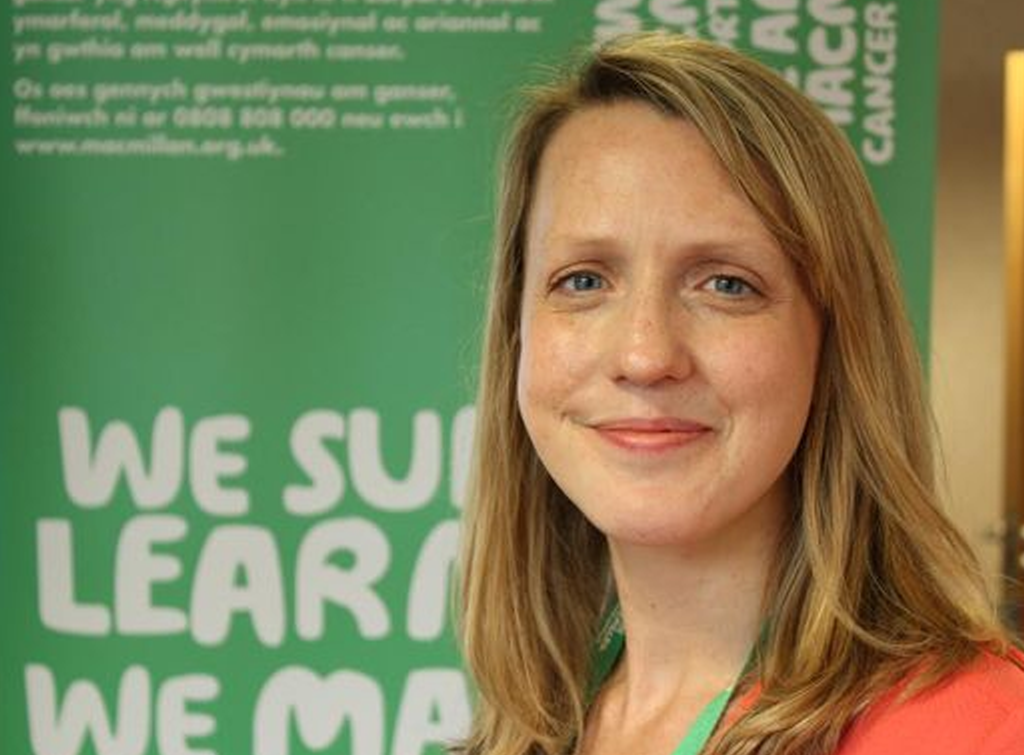Using psychological therapy to help people

Macmillan Clinical Psychologist Doctor Rachel Criddle explains how, with the help of a Macmillan training grant, she trained in Eye Movement Desensitization and Reprocessing (EMDR) therapy which helps patients move forward from their cancer experiences.
Psychological distress is a significant and ongoing problem for cancer patients. The emotional and psychological long-term side effects of cancer and its treatment include depression, anxiety, memory problems, difficulty concentrating, sexual problems and reduced social skills.
Patients may also have feelings of depression, hopelessness, anxiety and anger and adjusting to loss and change in physical functioning, change in physical appearance, self-esteem and sense of self, sexual functioning and intimacy, personal and social relationships and in life roles and aspirations. Patients also struggle to live with uncertainty about their future and life expectancy.
As part of my role as a Macmillan Clinical Psychologist I am often referred patients that have been traumatised by their cancer diagnosis and treatment.
To be able to help these patients process and come to terms with their cancer experiences I draw on a psychological therapy called Eye movement Desensitisation and Reprocessing Therapy (EMDR).
Eye Movement Desensitization and Reprocessing (EMDR) is an integrative psychotherapy approach that has been extensively researched and proven to be effective working with distressing or traumatic memories.
The theory behind EMDR is that many psychological difficulties are the result of distressing life experiences which have not been stored in the memory properly and are said to be unprocessed or blocked. These traumatic memories may need help to become processed, and EMDR is one way to do this.
I was able to train in this evidence based therapy for trauma related psychological difficulties using my Macmillan Individual Learning and Development Grant.
With this training I have been able to help many patients move forward from their experiences.
(The case studies I am sharing have all agreed for their stories to appear in this blog.)
Mrs D – flashbacks / reliving coming round from surgery
Mrs D was referred by a counsellor at a local cancer charity, as the counsellor felt that the patient’s difficulties were complex and would therefore warrant more of a level 4 intervention (support provided by qualified psychologists and psychotherapists).
Mrs D was diagnosed with a pituitary gland tumour and underwent brain surgery to remove this tumour. Mrs D was frequently experiencing flashbacks/re-living experiences (particularly at night) of her ITU (Intensive Therapy Unit) experience when she was coming round from her surgery.
For example, she was reliving her memory of feeling confused, agitated and scared as she was coming around, not knowing in that moment where she was and why she was there, and of seeing and hearing the hospital equipment around her and seeing a blood stain.
We used EMDR over two to three sessions and following this Mrs D told me in our last session that she was feeling much better.
She had stopped having flashbacks/re-living experiences of her time in ITU and she did not feel scared or afraid any more.
Mrs R – anxiety about stoma reversal surgery
Thirty-four-year-old Mrs R had bowel cancer and was referred for therapy by her Stoma Care Nurse.
Mrs R reported feeling traumatised by her cancer surgery and as a result was feeling very anxious about her upcoming stoma reversal surgery.
EMDR was used to help process her traumatic memories of previous surgery and to plan for the next.
Mrs R reported that she now feels a lot calmer and the memories are less traumatic and more like a normal everyday memory, and she feels more confident in coping with her upcoming surgery.
Mr D – disturbing memories of coming round from surgery
Mr D was a 50-year-old gentleman with head and neck cancer (tongue) who was referred by Clinical Nurse Specialist.
Mr D said he was also troubled at night by the flashbacks/re-living experiences of his ITU experience.
He had disturbing memories of the delusions and hallucinations he experienced whilst coming around from surgery.
Mr D engaged well with the EMDR, but our sessions are currently on hold as he has been unwell.
In 2015, in Wales, 61 Macmillan professionals were successfully awarded a Macmillan Individual Learning and Development Grant. Often money for training and development is limited within our partner organisations and this grant allows our professionals to access whatever training is most relevant to them and their role and enhances the service they offer their patients.
If you have any questions about cancer talk to our Support Line on 0808 808 0000 (open Monday to Friday 9am to 8pm) or visit our website: www.macmillan.org.uk for information and support.
You can read more about Rachel’s work for Macmillan Cancer Support here: http://www.macmillan.org.uk/aboutus/healthandsocialcareprofessionals/newsandupdates/macvoice/winter2015/howaclinicalpsychologistcansupportshareddecision-making.aspx